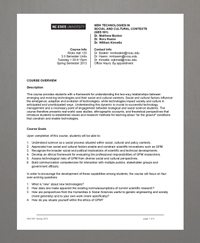Course 3
Taught each Spring semester to first year IGERT students
This course builds on background from the international summer course and on Principles of Genetic Pest Management. It provides all students with a framework for understanding the two-way relationships between emerging and evolving technologies and their social and cultural contexts. Social and cultural factors influence the emergence, adoption and evolution of technologies, while technologies impact society and culture in anticipated and unanticipated ways. Understanding this dynamic is crucial to successful technology management and a necessary point of engagement between biological and social science students.
The course presents real-world case studies, ethnographic accounts and theoretical perspectives that introduce students to established issues and research methods for learning about “on the ground” conditions that constrain and enable technologies. Matthew Booker (History), Nora Haenn (Anthropology), and William Kinsella (CRDM) lead this class examining three aspects of new technology development and social integration: 1) emergence and early establishment (“instantiation”); 2) risk assessment, management, perception and communication; and 3) policy formationand implementation processes. The course examines specific GPM examples, teaching students methods for risk assessment, risk communication and public policy development and analysis. Guest lectures on specific topics are given by David Auerbach (Philosophy), Carolyn Miller (CRDM), and Toddi Steelman (Natural Resources). The course ends with a final student presentations with participation of local external faculty (e.g., Cook-Deegan (Duke), Jackai (NCA&T), Pattanayak (Research Triangle Institute), Kramer & Wiener (Duke)).
Baseline learning outcomes
After completing the course, students will be able to:
- Understand science as a social process situated within social, cultural and policy contexts,
- Appreciate how social and cultural factors enable and constrain scientific innovations such as GPM,
- Recognize the broader social and political implications of scientific and technical developments,
- Develop an ethical framework for evaluating the professional responsibilities of GPM researchers,
- Assess technological risks of GPM from diverse social and cultural perspectives,
- Build communication competencies for interaction with multiple publics, stakeholder groups and government officials.
